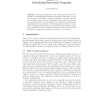Free Online Productivity Tools
i2Speak
i2Symbol
i2OCR
iTex2Img
iWeb2Print
iWeb2Shot
i2Type
iPdf2Split
iPdf2Merge
i2Bopomofo
i2Arabic
i2Style
i2Image
i2PDF
iLatex2Rtf
Sci2ools
293
click to vote
ACMMPC
2000
Springer
2000
Springer
Calculating Functional Programs
Abstract. Functional programs are merely equations; they may be manipulated by straightforward equational reasoning. In particular, one can use this style of reasoning to calculate programs, in the same way that one calculates numeric values in arithmetic. Many useful theorems for such reasoning derive from an algebraic view of programs, built around datatypes and their operations. Traditional algebraic methods concentrate on initial algebras, constructors, and values; dual co-algebraic methods concentrate on final co-algebras, destructors, and processes. Both methods are elegant and powerful; they deserve to be combined.
ACMMPC 2000 | Many Useful Theorems | Mathematics | Straightforward Equational Reasoning | Traditional Algebraic Methods |
Related Content
| Added | 01 Aug 2010 |
| Updated | 01 Aug 2010 |
| Type | Conference |
| Year | 2000 |
| Where | ACMMPC |
| Authors | Jeremy Gibbons |
Comments (0)

